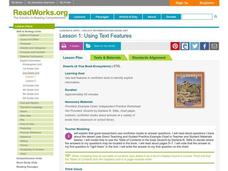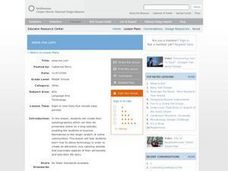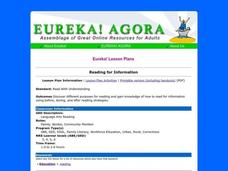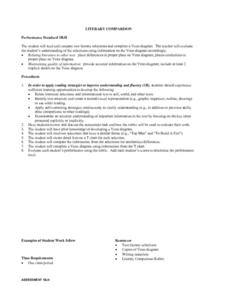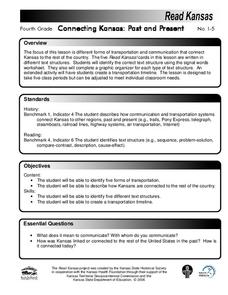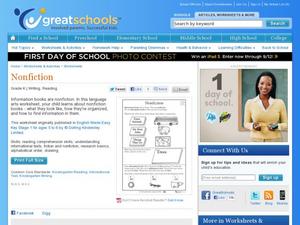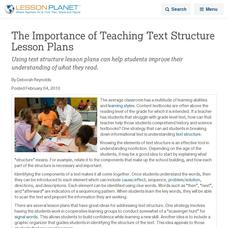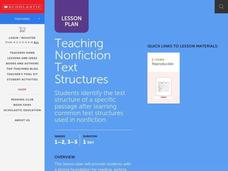Curated OER
Expressing Your Views to the Letter
Analyze the motivation, purpose, and value of letters to the editor by examining letters written in response to the violence at Columbine High School. For homework, middle and high schoolers write their own letters to the editor about an...
Curated OER
Using Text Features
Investigate a "table of contents" with your students! They read the table of contents in Deserts by Darlene R. Stille and predict where the answers to specific questions might be found. Learners complete a worksheet in which they find...
Curated OER
www.Me.Com
Create a graphic autobiography integrating images and text. Working within the structure of the programs Comic Life and Photoshop, pupils integrate the Principles of Design. They focus on balance, rhythm, proportion, and text structure....
Curated OER
Reading for Information
What should readers do to prepare for reading an informational text? What should they do during their reading? What should they do after completing such a text? Introduce your pupils to reading strategies and techniques to gain meaning...
Curated OER
Strong Convictions
How can the rhetorical structure of an editorial help to develop its argument? Use this New York Times editorial to emphasize the importance of structure in a piece of informational text. Adolescent writers then use the editorial as a...
Curated OER
Identifying Text Structure
Work on identifying text structure with this thorough learning exercise. After studying a diagram depicting six different text structures (compare/contrast, spatial, chronological, problem and solution, cause and effect, and order of...
Curated OER
Introducing the Memo
Examine the text structure of a memo with this worksheet. Eighth to twelfth graders decide if the purpose of a memo is to motivate an action or to provide information to the reader. They explore new vocabulary and make predictions prior...
Curated OER
Literary Comparison
Compare and contrast two pieces of literature with this lesson. With the use of a Venn diagram, pupils make connections between literature and real-life situations. They practice skills of surveying a text looking for important details,...
Curated OER
Fast Fact-Finding
Ever wonder why the sky changes color so often? Readers examine an informational excerpt from John Farndon's How the Earth Works. They underline key points as they read and then answer five response questions. Prompts review main points,...
Curated OER
Text Structure Booklet
Middle schoolers work on comparing and contrasting different text structures with this project. First, they study an example of a sample page in a booklet, which they go on to use as a model. They complete a booklet with text structure,...
Curated OER
Connecting Kansas: Past and Present
Upper graders identify five forms of transportation and describe how Kansans are connected to the rest of the country using transportation and communication. They complete a graphic organizer for each type of text structure given to them...
Read Works
Signal Words in Expository Text
Signal words are one way that authors make the relationships between their ideas clear. Allow your learners the chance to investigate cause and effect in texts by identifying signal words. They locate and analyze cause-and-effect...
Curated OER
Alphabet Poems
Develop fluency with a variety of works. Help kindergartners use multiple strategies to understand text and decoding. They will create an alphabet poem book on Kid Works 2 to illustrate and write their own poem. In the end, they will...
Curated OER
Text Structure: Organizational Patterns
Explore plot structure by analyzing text samples with writers. They define terms such as problem and solution, cause and effect, and story arc. They also identify the sequences used in modern stories by reading samples and determining...
Curated OER
Nonfiction
As scholars begin using informational texts, it's important they understand their uses and features. This visual worksheet has readers match three text titles to corresponding pictures. Next, they examine a book cover with the...
Curated OER
Nonfiction Text Features
Identify features of a nonfiction article in this language arts lesson. Middle schoolers apply comprehension strategies as they read the parts of the article, and analyze the author's key points. Additionally, they examine information in...
Curated OER
The Importance of Teaching Text Structure Lesson Plans
Using text structure lesson plans can help students improve their understanding of what they read.
Curated OER
Teach Text Structure for Nonfiction
Students gain a strong foundation for reading, writing, and using nonfiction through this lesson plan. They gain an awareness and general understanding what text structures are. Students also identify and interpret what clues they can...
Curated OER
Context Clues, Plot Structure, Conflict, and Personal Narrative Essay
What are the elements of a personal narrative? Get your class talking by reading "The Necklace" and "A Dangerous Game." The lesson focuses primarily on defining certain vocabulary terms (like context clues, plot, conflict, climax, etc.)...
Curated OER
Teach Text Structure for Nonfiction
Young scholars explore the patterns of text structure to anticipate the kind of information that a reading might present. The lesson examines some of the components of reading writing and using nonfiction.



